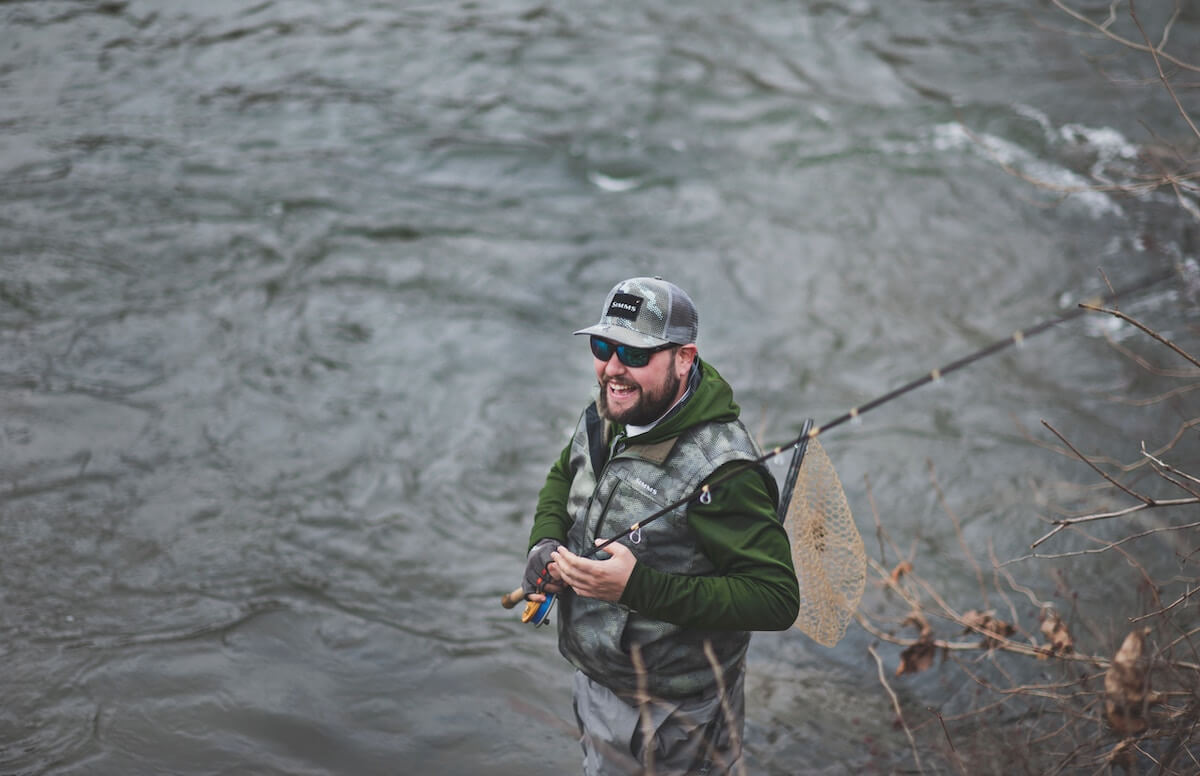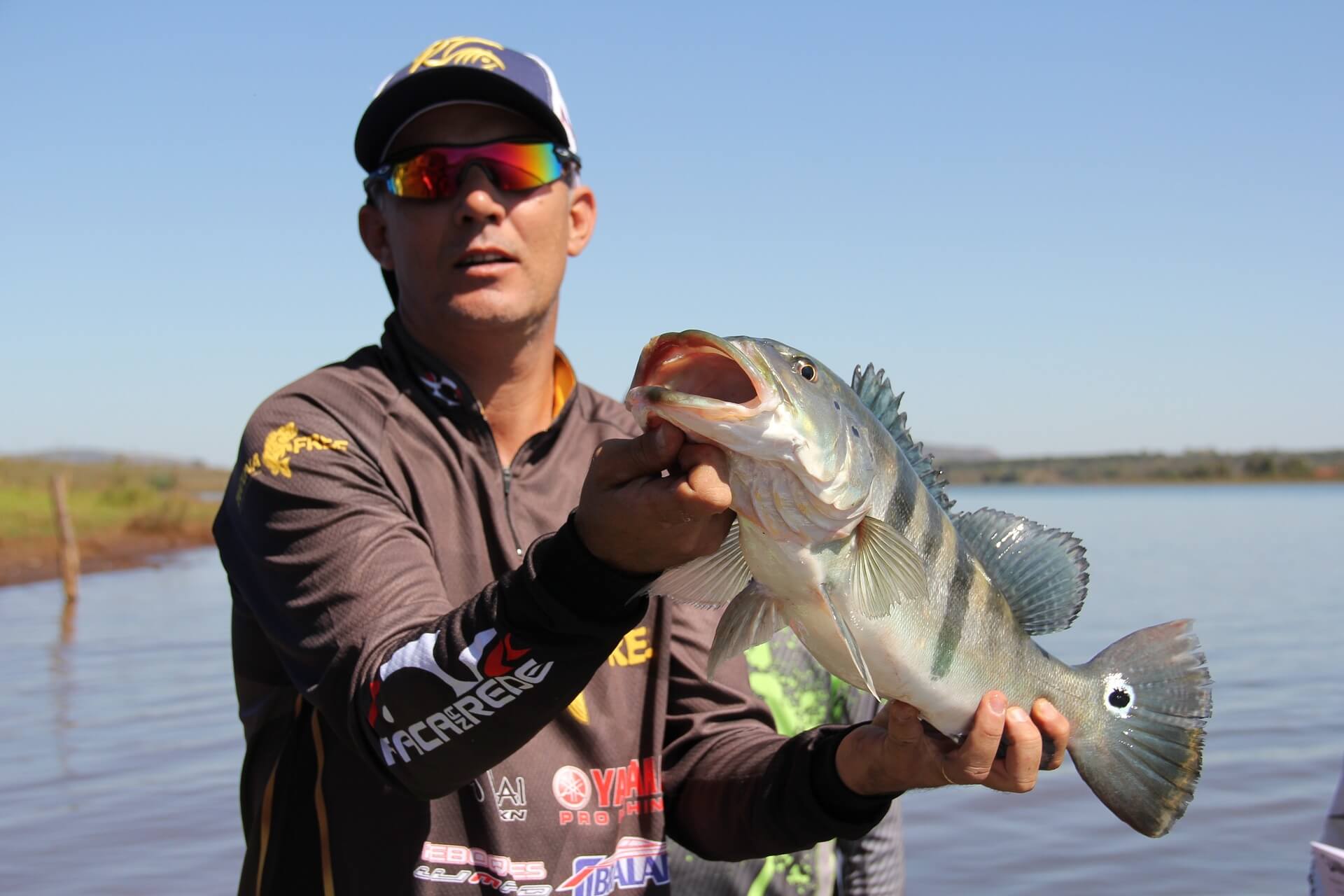Lake Fishing Tips for Beginners – 9 Things to Know Before You Go!
Lake fishing might seem like a fairly simple concept at first glance. If you’re planning your first trip, there are a few key points you’ll need to understand in order to get the most out of your first experience.
As a beginner, you probably have a lot of questions about lake fishing.
- What kind of hooks should you use?
- Which spot should you start fishing on the lake?
- What kind of bait should you use for certain kind of fish?
I’ve compiled a list of the basic tips and things you’ll need to understand as a beginner.
Follow these tips and you’ll be reeling in fish in no time at all.
Get a Boat

The most important tool in your fishing arsenal is a boat.
Having a boat puts you at a major advantage over being stuck on the shore as you can get to those hard-to-reach places that are tough to reach on foot. Large lakes and reservoirs have lots of shorelines and there are some good and bad spots to find fish.
A boat doesn’t necessarily have to be the biggest, fastest watercraft on the lake, either.
Having a fishing kayak or canoe is sometimes better if you’re targeting certain species of fish.
If you don’t have access to a boat, don’t worry.
You can still catch plenty of fish from the shore with a little effort and determination. If you’re on foot, be sure to fish around fallen trees, rocks or other natural debris – known as structure.
Also, be as quiet and stealthy as you can. Fish have good eyesight and hearing, and can sense predators approaching on the shore. If they spot you, they’ll be gone before you know it.
I actually prefer to fish from the bank sometimes as it allows me to sneak into the best fishing spots undetected most of the time.
Larger fish will see or hear a boat coming and get out of the area, but if you take your time and move in without making too much noise, you can catch some huge fish from the shoreline.
Know the Fish in Your Lake

In order to catch fish at any lake, you’ll need to have a basic understanding of which species of fish are in the water.
There are plenty of resources on the internet that detail which specific kinds of fish you can find in certain areas.
But, if you want the scoop on exactly where the fish are and what they’re biting, it’s always a good idea to ask some of the local fishermen around the lake you plan to fish in.
It’s best to pick out one or a few different species of fish to target before you plan your trip.
This will allow you to study the fish’s habits and select the proper bait and tackle to use. Some species of lake fish will stay near the banks, making them easier to catch from the shoreline, while others tend to stay in the deeper, open water.
I do as much research beforehand as I can on the particular area or body of water I plan to fish. Doing research might be one of the most underrated lake fishing tips I could give to a beginner, but it will certainly pay off on the water.
There are plenty of resources online to find out a wealth of information about any lake you plan to fish.
One of my favorite species to go after is lake trout because they are ferocious fighters and one of the best-tasting fish species to be found. If you were planning to fish for lake trout, do plenty of research on the best lake trout fishing tips you can find online.
Choose the Right Bait

Once you’ve selected the type of fish you’re after, then you can make a decision on which kind of bait to use.
Fishing with something like minnows will allow you to catch a number of different lake species. There are many different kinds of fish that will feed on smaller minnows, making this the ideal bait for lake fishing.
Worms and grubs are also a good all-around bait for lake fishing as they will attract bites from a wide range of fish species.
Crickets or grasshoppers are great for catching smaller panfish, but won’t help you hook into a larger species like striped bass.
Studying the type of fish in your lake and what they typically eat is key to understanding which bait you’ll need to use.
Here is a great video from Bill Monroe on which hooks to use with a particular type of bait.
Being aware of what certain kinds of fish prefer to eat is key.
Most beginner fishermen might assume that all catfish like to eat dead, bottom-dwelling foods. However, there are species like the flathead catfish that actually hunts for panfish much like other game fish such as bass or pike.
Knowing the difference between what largemouth bass like to eat and what lake trout prefer to eat will play a large role in the success of your trip.
For instance, tips for river fishing for bass is quite different than lake fishing tips for bass.
Artificial lures may seem like a great option, but these aren’t typically recommended for beginners. There are many different techniques and specific components that go along with using artificial lures, so it’s best to keep it simple and start with live or cut bait.
Just keep it simple and start out using natural baits.
I like to use artificial baits for many of my lake fishing trips, but it’s best for a beginner to stick to natural baits as these will usually be much easier to use and get the hang of.
Start Early or Start Late
Fish are predators, which means they seek to take advantage of their surrounding elements to ambush prey.
Most fish species are usually active early in the morning or late in the evening as light becomes faint and they are able to more easily move undetected in search of a meal.
Fish are much like humans when it comes to their habits during the day and night. If it’s hot outside, fish will usually go to deeper, cooler water or find shelter underneath different kinds of structure.
The best fishing will always be done in the early morning or late evening when fish are most active. This is an added benefit for you as you can usually avoid the lake during those blazing hot midday temperatures during the summer.
Use the Right Tackle

Depending on the particular species of fish you’re going after, you should select the right gear and tackle.
When fishing for smaller species, it’s recommended to use a smaller rod with light fishing line and smaller hooks.
Going after bigger fish? You’ll need bigger gear.
You can use many kinds of medium-sized rods and reel combos to fish for both large and small fish species, but always make sure your rod, reel, line, and hook are large and strong enough to withstand a fight against a monster fish.
Personally, I prefer to use a medium-sized rod and reel combo because it allows me to target a larger variety of fish species.
Pick the Right Line to Prevent Breaks
A broken fishing line on the lake will equal a broken heart in most cases as that giant fish you’re going after will be long gone with your bait and hook.
Understanding the three types of fishing line and when to use them is a big part of being a successful angler.
Choosing the right size line will require you to determine the right pound-test needed for your lake. Going with a line that is too light will risk having it break when you’re reeling in a fish. A line that’s too heavy will get fewer bites because many fish will see or sense it and be gone before you know it.
This is one more reason why I recommend doing plenty of research on the particular type of fish you plan to target.
Become familiar with what the experts recommend and choose your line wisely.
Be Patient

This might seem insignificant, but it is perhaps one of the most important lake fishing tips for beginners that I can give you.
You won’t be catching a fish every time you dip your hook in the water. Fishing is a great pastime that helps teach us patience in a way that lets us sit back and enjoy nature.
There will be some days when you get few or no bites at all.
Don’t let that discourage you from taking another trip and trying out different techniques or baits.
With a little perseverance and determination, you’ll eventually find the right spot and realize why fishing is so enjoyable for many of us.
I’ve had some lake fishing trips when I didn’t catch a single fish.
But, I’ve also been lake fishing before and caught huge numbers of fish.
But remember, you won’t always catch fish when you’re out on the lake.
That’s why it’s called fishing—not catching.
Use the Elements to Your Advantage
According to most devout anglers, it’s never too cold or too hot to go fishing. Understanding how fish behave in specific weather patterns will help you become an expert fisherman.
Having a knowledge of how fish behave when it rains or when it’s very cold will be the difference in a lake fishing trip with no fish, or a great day on the water.
Cold weather tends to make lake fish lethargic and slow, which means you’ll need to fish slow and deep.
Likewise, when it’s warmer outside, you can use baits that target fish near the surface.
Do you see a storm approaching in the weather forecast? Grab your fishing rod and head to the lake because this is sometimes when fish are most active.
Don’t let the weather keep you from fishing. I’ve been fishing in sweltering temperatures and also when it’s snowing outside and caught plenty of fish in both scenarios.
Be sure to dress accordingly so you can stay comfortable and dry during your trip.
Most Importantly…Have Fun!
I hope all of these tips don’t seem overwhelming to anyone who is a beginner on the lake.
Fishing is one of the greatest pastimes on the planet and you’ll quickly realize why so many people love it.
Fishing is sometimes best when you’re with a friend, so once you’ve gotten these basic tips down, don’t hesitate to invite someone to tag along with you.
Go into your lake fishing trip with a positive attitude and focus on enjoying the experience – not just catching fish. There is plenty of natural beauty to take in and appreciate while you’re on the lake fishing.
I hope you can use these tips to keep your lines tight and your hooks wet!












